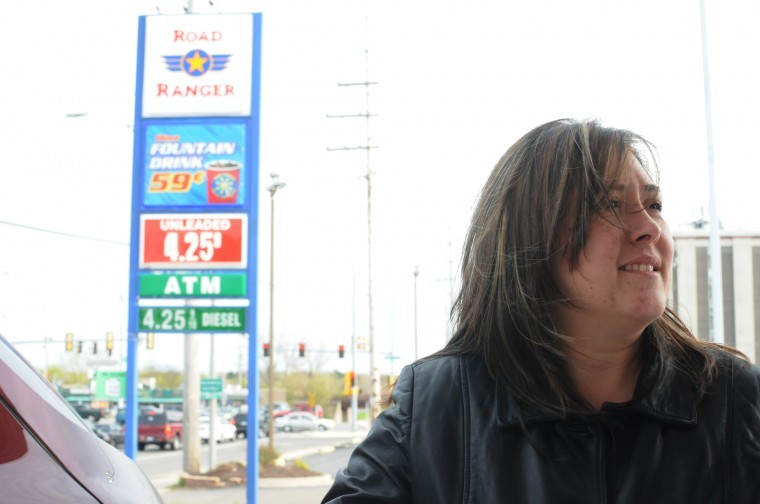Gas prices put financial burden on commuter students
Shirley Floreani, senior commuter student from Westchester, fills up her Nissan Murano Monday night at Road Ranger, 125 N. Annie Glidden Rd. Gas prices put a financial strain on commuter students.
May 2, 2011
DeKALB | Though students from out of town do not pay for room and board or dining plans, many do have to spend more of their money on one thing the rest of the student body does not – gasoline.
Gas prices have been skyrocketing over the past months and they show no signs of stopping, students who fill up at $4 per gallon to get to class each week are burning holes in their wallets.
Freshman history major Alec Taylor said he is appalled at the increase in gas prices.
“I am going through so much money to pay for gas to get to school and back,” Taylor said.
Taylor said he commutes 50 miles to and from school, which quickly empties his gas tank and his wallet.
In the DeKalb area, gas prices currently range from $3.95 to $4.25. In areas closer to Chicago, prices are even higher. Taylor is from Sandwich, about 29 miles away, where prices range from $3.99 to $4.09.
Taylor said he works four days a week to pay for his gas, which costs him anywhere from $30 to $50 a week. Along with having a job to pay for gas, being a full-time student is very stressful, Taylor said.
“I have so much work to get done and my job has me staying late at night,” Taylor said.
Taylor said he had no choice but to work in order to pay for the increasing gas prices. Otherwise, he said he won’t be able to get to school.
“Seeing gas prices almost $4 a gallon is just unbelievable to me,” Taylor said.
Eugene Bautista, a sophomore health and human sciences major, also shared his frustration with the cost of gas.
“I feel that gas prices are getting so ridiculously bad that the time will come when it will be cheaper to live on campus than to commute,” Bautista said.
Bautista also commutes a total of 50 miles to and from the university, but does not pay for his own gas. He also suggested that the school grants traveling students a bit of leniency due to the high price to fill up.
“The school…should try to make it easier for students who commute by allowing kids to turn in things online in every class or at least not have to make us pay for parking,” Bautista said.
In Naperville, gas has reached as high as $4.39, with the lowest at $4.04, Schaumburg’s gas prices range from 4.23 to $4.35, and Elgin’s rates vary starting at $4.07 to $4.29. Chicago is the most expensive, with the highest price ceasing at $4.69.
Senior accountancy major Cody Daniels said he paid about $50 to $60 a week in fuel costs commuting to the Elburn train station. He has an internship in Chicago that he goes to every day.
“People are hurting for money and this isn’t helping at all,” Daniels said. “But there’s not much we can do about it.”
Senior anthropology major Steven Osikowicz said rising gasoline costs have not affected him much currently, but will have an impact later on in the summer.
“I will feel the effect of these prices because I am driving to California this summer,” Osikowicz said. “They might affect how much I am able to do.”
Osikowicz said while it is not a good thing that gas prices are on the rise, he is not surprised by the trend.
“This happens around this time every year,” Osikowicz said. “It’s a bummer, but it happens.”
Senior biology major Matt Smith said the increase in gasoline prices have had an effect on how he and his roommate get home on weekends.
“My roommate and I fight about who is going to drive home, because no one wants to pay for it,” Smith said.
Economics professor Khan Mohabbat, an expert in gasoline and energy costs, said in the long term, gasoline and energy costs depend on supply and demand.
“Demand depends on various countries’ abilities to manufacture goods and services,” Mohabbat said. “In the short term, the manipulation of supply and demand is in the hands of speculators and traders.”
Mohabbat said he does not expect to see gasoline prices decline in the long-term.



